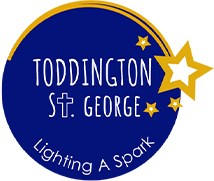English Reading
Rationale
At Toddington St. George Church of England School we are committed to ensuring that all of our children "Let their Light Shine" (Matthew 5:15-16), and flourish. In order to support our children in Lighting A Spark. We whole-heartedly believe that reading is of vital importance to all children. We believe that it is our moral duty to ensure that all of the children in our care are taught how to read and how to understand what they have read and link it to their own lives and experiences.
We do this through teaching both word recognition and comprehension skills alongside each other. Good comprehension draws from linguistic knowledge (in particular of vocabulary and grammar) and on knowledge of the world.
Comprehension skills develop through pupils’ experience of high-quality discussion with the teacher, as well as from reading and discussing a range of stories, poems and nonfiction.
Intent
At Toddington St George we are proud to offer the pupils a text rich learning environment where imagination and creativity can be fuelled. Through our rigorous phonics curriculum, we ensure pupils develop the skills and knowledge they need to develop as confident readers who have a love of books. Through reading in particular, pupils have a chance to develop culturally, emotionally, intellectually, socially and spiritually. Literature, especially, plays a key role in such development. Reading also enables pupils both to acquire knowledge and to build on what they already know. All the skills of language are essential to participating fully as a member of society; only pupils who learn to speak, read and write fluently and confidently are able to effectively participate in wider society. By the end of Year 4 all children will be able to read fluently and with confidence in any subjects in their future education.
The more that you read, the more things you will know. The more that you learn, the more places you will go.
Dr Seuss
EYFS:
There is an emphasis on phonics teaching in EYFS. It supports children’s understanding that letters represent sounds in spoken words which will support their decoding of the printed word. ‘Little Wandle’ is used as a basis for a daily phonics session. Phonics assessments are completed continuously throughout the year.
KS1:
Teachers assess reading against the National Curriculum end of year objectives and teaching reading and comprehension skills daily. Phonics continues to be taught and assessed daily using Little Wandle and leads to the national phonics screening check (PSC) which is reported at the end of Key Stage 1.
KS2:
Children needing extra phonics support continue with this in Year 3.
Reading takes place daily and objectives and success criteria are taken from the National Curriculum and are matched to the child’s ability. We follow the Little Wandle book banding scheme and then pupils move onto Accelerated Reader tailored reading recommendations .
Little Wandle book banding is used to identify a child’s reading level. Once children have completed the Little Wandle program and have demonstrated that they are able to read a wide range of text confidently with good comprehension, then they become a free reader and move onto our Accelerated Reader Program.
Accelerated Reader motivates pupils to read more through engaging quizzes, goal setting, and personalised recommendations. As pupils increase their reading volume, they develop greater reading stamina, word recognition, and language comprehension skills.
Children’s individual progress is recorded using assessment tools. All children use a reading record to share reading comments between parent/carers and school. Comprehension skills are taught and assessed alongside this and National Curriculum Assessments.
Phonics and Independent Reading Scheme
Little Wandle is a phonics program that helps our children to learn to read and spell. It is used to deliver daily phonics sessions, from Nursery to Year Two.
Our reading scheme offers phonetically decodable books, that have been organised by colour book bands. Early readers select books that are matched to their decoding ability.
Once children have completed turquoise level and have demonstrated that they are able to read texts fluently with good comprehension, they move onto our Accelerated Reader scheme. Children select free reader texts that have been organised by their level of reading/lexical difficulty.




